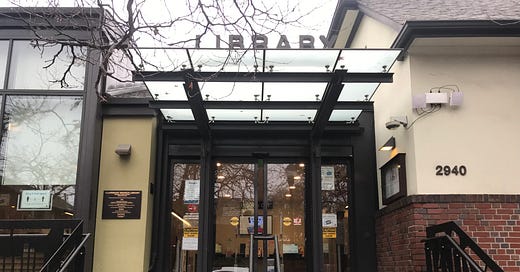Picked up a couple of books at the library today, and as I scanned each of them for check-out, I had a sensory flashback to when I was a kid. It was the feel of the plastic encasing around the thick hard edges of the book covers; one book so thick I could barely grab it with one hand. Reading the author blurbs on the back cover, I felt a surge of excitement, anticipating the new story and author I would soon discover.
As I walked back home, cradling both books in the nook of my left arm, I realized that I was also holding a beaming smile. It reminded me of when I was young. Books from the library were like little treasures. The plastic cover, the catalog ID on the spine, the smell of the book’s interior, and yes, the cover art too; it all adds to the excitement.
Books offer the pure gift of great stories, told in myriad ways, about all kinds of characters and topics and settings, inviting us to experience new and different ways of thinking, expressing, and being. The joy of an anticipated book, as I thought about it on my walk, was actually better than anticipating an ice cream sundae, because a book lasts longer. A sundae lasts minutes; a book, days to weeks. Days, if you’re devouring.
Discovering and remembering books
I purchase books, but most of the books I read are loans from the Berkeley Public Library. I’ve also discovered fabulous books inside the mini-library boxes around my neighborhood. I prefer printed books, so buying all my books would severely curtail the amount I read, due to my limited budget and shelf-space. More than that, borrowing books allows me to enjoy reading in a more open and adventurous way. I’ve discovered so many wonderful books “by accident.” Random books on a shelf that I wouldn’t have otherwise looked for, known about, or purchased.
A confession: It takes very little time before I stop being able to readily recall an author name, book title, and complete plot. I wish I did! I’d be far quicker to bring books up in conversation if I had that easy recall. My mind has a tendency not to remember details; it remembers gists. It’s difficult to accept this aspect about myself, because this even applies to books I love, so it was a relief to discover I’m not alone!
I invite you to read Melissa Kirsch’s “At Capacity” in the New York Times’ Morning Brief. An excerpt:
What does it mean for a book, a show, an experience to “count,” anyway? Do you need to be able to recall the plot in detail? Should you be able to describe scenes or bits of dialogue, larger themes, cultural relevance? Or is it enough to just remember enjoying a book, or to be able to conjure a feeling it inspired? I was mulling these questions when I came across this essay by James Collins from 2010. In it, he describes books that he loved about which he remembers nothing: “All I associate with them is an atmosphere and a stray image or two, like memories of trips I took as a child.”
"Collins suspected, as I do, that the books he can’t remember must have had an effect on his brain anyway, that the experience of reading and engaging with the texts must have changed him in some deeper way, leaving “a kind of mental radiation — that continues to affect me even if I can’t detect it.”
How I remember and “catalog” all the books I read
After I finish a book, I take a photo of the cover and put it in a digital photo album on my phone and laptop, aptly titled, “Books.” I also jot a note about the book in the description field, so I can remember more details when looking back. As of today, I have 186 book photos from the past eight years, so that’s an average of twenty-three books per year.
My taste in books is wide-ranging, largely because I enjoy those unexpected finds. I like fiction and non-fiction equally. I also read books in Spanish, and because my library has a smaller selection of those, I have read a lot of Spanish books I never would’ve chosen to read otherwise. I’m actually happy about that. I’ve read fiction, memoirs, fantasy realism, non-fiction, spiritual books, and biographies. I’ve also read novels translated to Spanish from Japanese or French, which aren’t available in English yet. One of my faves is Todo el azul del cielo, a young adult novel by the French author Mélissa Da Costa. (The title is written correctly: it’s listed without the caps.)
Books! Movies! Classes! Tools! Legal help!
For those who aren’t currently public library members, I imagine most libraries offer the same service that mine does: you can peruse the catalog and place a hold on a book (or other loan item) on your library’s website. The library will then place that item with your name on a dedicated pick-up shelf at the branch of your choosing. (You can also borrow ebooks for downloading, of course.)
Public library members across the U.S. (and several other countries) can also use their library card to join Kanopy, a free streaming platform of independent films, foreign films, documentaries, and art films. I’ve discovered some real gems on that platform and highly recommend it. Not only is it free, it has far more quality selections than some of the streaming platforms you might be paying for.
Public libraries serve the local community in countless other ways. They not only offer loans of written, visual, and audio materials, they also offer an amazing variety of free classes and events. (There are fifty categories to choose from in my library’s drop-down selection!) They also feature author talks; book discussion clubs; pre-teen and teen libraries and events; literacy programs; and assistance for people in need of social services, including legal resources and volunteer helpers.
The Berkeley Public Library also includes a Tool Lending branch. How cool is that? It was among the first of its kind when it opened in 1979 and quickly became a model for other libraries. What a great idea! You can learn how to use a tool there (they host free how-to workshops), and you can borrow anything from weed-eaters, plumbing snakes, and extension cords; to air fryers, food dehydrators, and bundt cake pans. (I just borrowed a cupcake tin, made a dozen cupcakes, and returned the tin a week later. 😋.)
A most appropriate book recommendation
Check out The Library Book by Susan Orlean. I’ll paste author Dave Eggers’ endorsement blurb here, because he describes it perfectly:
“This is a book only Susan Orlean could have written. Somehow she manages to transform the story of a library fire into the story of literacy, civil service, municipal infighting and vision, public spaces in an era of increasingly privatization and social isolation, the transformation of Los Angeles from small provincial hamlet to innovative collossus and model of civic engagement—and the central role libraries have always and will always play in the life and health of a bustling democracy. Beyond all that, like any good library, it’s bursting with incredible tales and characters. There could be no better book for the bookish.”
—Dave Eggers, author of The Circle and The Monk of Mokha
YES to all of that. Reading her book was not only enjoyable, it deepened my respect for everything-library and everything-librarian. (When my husband teasingly calls me “the librarian,” I take it as a compliment, thank you very much.)
If you aren’t already a member of your city’s public library, what are you waiting for? I encourage you to sign up. Enjoy the many benefits it offers!
Related posts:
* “Celebrating your public library: Ten (plus) benefits from joining. 🤓 They go well beyond books!” (In celebration of National Library Week.)
* “Writing tips: For flow, for clarity, and for new ideas”
* “Ten pointers for Grammar Day, 2025: Do any of these mistakes apply to you? 🧐”
✳️ Would you like some editing consultation? As a freelance editor, I can help with story development (developmental editing), research, or copyediting. Please reach out for more information. (If you’re on LinkedIn, you can also find me there.)






Bravissima! What a beautiful piece. Libraries have been my lifelong love & I so appreciate your appreciation of these glorious spots of reading & relaxation. Did my heart good. ❤️